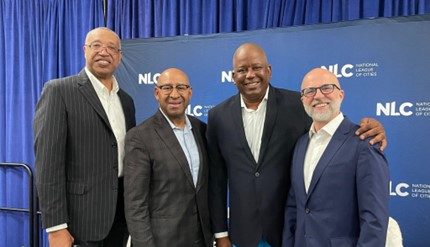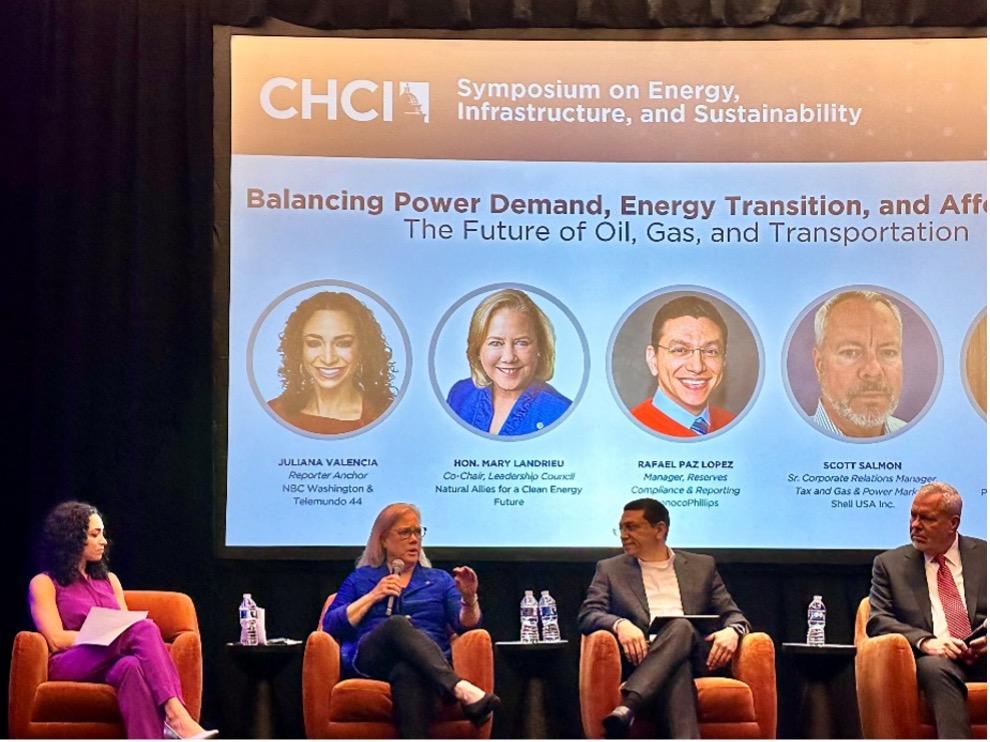Natural Allies Puts Energy Accessibility and Affordability for Marginalized Communities Front and Center at National League of Cities (NLC) Centennial City Summit
Former Congressman Kendrick Meek (D-FL) and former Philadelphia Mayor Michael Nutter participated in panel conversations at the conference
(Tampa, FL) – On Friday, November 15, members of Natural Allies Leadership Council led a panel conversation entitled, Expanding Energy Sources for Accessibility, Affordability and Equity at the National League of Cities (NLC) Centennial City Summit in Tampa, Florida. The conversation focused on the energy transition and the need to expand natural gas infrastructure alongside renewables to meet growing energy demand, lower emissions and ensure accessibility, affordability and equity for marginalized communities.
Former Congressman Kendrick Meek (D-FL), Natural Allies Leadership Co-Chair, moderated the panel and was also joined by panelists, Former Philadelphia Mayor Michael Nutter, Natural Allies Leadership Co-Chair, Ralph Cleveland, President & CEO of the American Association of Blacks in Energy and Neel Brown, Managing Director of The Progressive Policy Institute (PPI).
“It is vital for all of us to understand how energy policies are affecting middle-class and working-class families in communities across America,” said Rep. Kendrick Meek (D-FL). “As we think about an energy transition in the years ahead, we must ensure that it remains affordable and reliable for American households as we reduce emissions. Partnering natural gas with renewables offers an immediate and affordable solution to keep energy bills low while reducing carbon emissions and supporting historically marginalized communities in the transition to a cleaner energy future.”
Brown previewed preliminary results from an upcoming report from PPI, Energy Cost Burdens and Pragmatic Environmental Justice.
Brown highlighted the size of the wealth gap between White and Black households, and shared mapping data identifying neighborhoods that are most energy insecure – currently sacrificing food and medicine to pay energy bills – which are disproportionately located in Black communities. The report will be completed this winter and will provide members of NLC with information on how to keep the energy transition moving forward while lowering emissions in the fairest, most just way.
“In our research, we are looking at how energy policy choices affect the most disadvantaged communities across America,” said Neel Brown, Managing Director, Progressive Policy Institute. “Our data is showing that in an era of increasing energy demand, some environmental activists are insisting that cities constrain their supply of natural gas, either through denial of new natural gas pipelines or dismantling existing infrastructure. Those choices will not only increase this energy burden disproportionately on black and brown communities, but in many cities in the northeast it’s already happening.”
Panelist Ralph Cleveland, President & CEO of the American Association of Blacks in Energy emphasized the importance of natural gas. “More than a third of Black Americans are challenged from an energy burden standpoint, which is why natural gas, given its abundance and affordability, is such an essential part of the energy mix. It’s a low-carbon, reliable and affordable solution for all communities. And there are ways to integrate the technologies to create an even lower carbon footprint, due to the efficiencies gained.”
Additionally, Former Philadelphia Mayor Michael Nutter participated in a panel conversation entitled Community Resilience and Grid Reliability in a Clean Energy Economy on Saturday, November 16. The conversation dove into the clean energy transition, how local governments are deploying renewable energy, and discussed methods for improving community resilience and energy reliability in the face of extreme weather events such as hurricanes, flooding and wildfires.
“It is incredibly important to recognize that climate, reliability, and affordability are all connected across political party lines and geographies,” said Nutter. “We need to be sure that policymakers and elected officials have the information they need to make the best decisions on how to keep this energy transition moving forward and lowering emissions but doing it in the fairest, most just way.”
###

